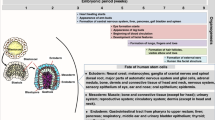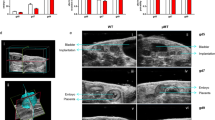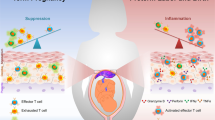Abstract
Pregnancy constitutes a major challenge to the maternal immune system, as it has to tolerate the persistence of paternal alloantigen. Although localized mechanisms contribute to fetal evasion from immune attack, maternal alloreactive lymphocytes persist. We demonstrate here an alloantigen-independent, systemic expansion of the maternal CD25+ T cell pool during pregnancy and show that this population contains dominant regulatory T cell activity. In addition to their function in suppressing autoimmune responses, maternal regulatory T cells suppressed an aggressive allogeneic response directed against the fetus. Their absence led to a failure of gestation due to immunological rejection of the fetus.
This is a preview of subscription content, access via your institution
Access options
Subscribe to this journal
Receive 12 print issues and online access
$209.00 per year
only $17.42 per issue
Buy this article
- Purchase on Springer Link
- Instant access to full article PDF
Prices may be subject to local taxes which are calculated during checkout





Similar content being viewed by others
References
Tafuri, A., Alferink, J., Moller, P., Hammerling, G.J. & Arnold, B. T cell awareness of paternal alloantigens during pregnancy. Science 270, 630–633 (1995).
Munn, D.H. et al. Prevention of allogeneic fetal rejection by tryptophan catabolism. Science 281, 1191–1193 (1998).
Mellor, A.L. et al. Prevention of T cell-driven complement activation and inflammation by tryptophan catabolism during pregnancy. Nat. Immunol. 2, 64–68 (2001).
Rouas-Freiss, N., Goncalves, R.M., Menier, C., Dausset, J. & Carosella, E.D. Direct evidence to support the role of HLA-G in protecting the fetus from maternal uterine natural killer cytolysis. Proc. Natl. Acad. Sci. USA 94, 11520–11525 (1997).
Mellor, A.L. & Munn, D.H. Immunology at the maternal-fetal interface: lessons for T cell tolerance and suppression. Annu. Rev. Immunol. 18, 367–391 (2000).
Makrigiannakis, A. et al. Corticotropin-releasing hormone promotes blastocyst implantation and early maternal tolerance. Nat. Immunol. 2, 1018–1024 (2001).
Xu, C. et al. A critical role for murine complement regulator crry in fetomaternal tolerance. Science 287, 498–501 (2000).
Jiang, S.P. & Vacchio, M.S. Multiple mechanisms of peripheral T cell tolerance to the fetal “allograft”. J. Immunol. 160, 3086–3090 (1998).
Beagley, K.W. & Gockel, C.M. Regulation of innate and adaptive immunity by the female sex hormones oestradiol and progesterone. FEMS Immunol. Med. Microbiol. 38, 13–22 (2003).
Mattsson, R., Mattsson, A., Holmdahl, R., Whyte, A. & Rook, G.A. Maintained pregnancy levels of oestrogen afford complete protection from post-partum exacerbation of collagen-induced arthritis. Clin. Exp. Immunol. 85, 41–47 (1991).
Thellin, O., Coumans, B., Zorzi, W., Igout, A. & Heinen, E. Tolerance to the foeto-placental 'graft': ten ways to support a child for nine months. Curr. Opin. Immunol. 12, 731–737 (2000).
Sakaguchi, S. et al. Immunologic tolerance maintained by CD25+CD4+ regulatory T cells: their common role in controlling autoimmunity, tumor immunity, and transplantation tolerance. Immunol. Rev. 182, 18–32 (2001).
Bystry, R.S., Aluvihare, V., Welch, K.A., Kallikourdis, M. & Betz, A.G. B cells and professional APCs recruit regulatory T cells via CCL4. Nat. Immunol. 2, 1126–1132 (2001).
Maloy, K.J. et al. CD4+CD25+ TR cells suppress innate immune pathology through cytokine-dependent mechanisms. J. Exp. Med. 197, 111–119 (2003).
James, E. et al. Multiparity induces priming to male-specific minor histocompatibility antigen, HY, in mice and humans. Blood 102, 388–393 (2003).
Fontenot, J.D., Gavin, M.A. & Rudensky, A.Y. Foxp3 programs the development and function of CD4+CD25+ regulatory T cells. Nat. Immunol. 4, 330–336 (2003).
Hori, S., Nomura, T. & Sakaguchi, S. Control of regulatory T cell development by the transcription factor Foxp3. Science 299, 1057–1061 (2003).
Khattri, R., Cox, T., Yasayko, S.A. & Ramsdell, F. An essential role for Scurfin in CD4+CD25+ T regulatory cells. Nat. Immunol. 4, 337–342 (2003).
Sutmuller, R.P. et al. Synergism of cytotoxic T lymphocyte-associated antigen 4 blockade and depletion of CD25+ regulatory T cells in antitumor therapy reveals alternative pathways for suppression of autoreactive cytotoxic T lymphocyte responses. J. Exp. Med. 194, 823–832 (2001).
Aseffa, A. et al. The early IL-4 response to Leishmania major and the resulting Th2 cell maturation steering progressive disease in BALB/c mice are subject to the control of regulatory CD4+CD25+ T cells. J. Immunol. 169, 3232–3241 (2002).
Golgher, D., Jones, E., Powrie, F., Elliott, T. & Gallimore, A. Depletion of CD25+ regulatory cells uncovers immune responses to shared murine tumor rejection antigens. Eur. J. Immunol. 32, 3267–3275 (2002).
Barthlott, T., Kassiotis, G. & Stockinger, B. T cell regulation as a side effect of homeostasis and competition. J. Exp. Med. 197, 451–460 (2003).
Jameson, S.C. Maintaining the norm: T-cell homeostasis. Nat. Rev. Immunol. 2, 547–556 (2002).
Ernst, B., Lee, D.S., Chang, J.M., Sprent, J. & Surh, C.D. The peptide ligands mediating positive selection in the thymus control T cell survival and homeostatic proliferation in the periphery. Immunity 11, 173–181 (1999).
Takahashi, T. et al. Immunologic self-tolerance maintained by CD25+CD4+ regulatory T cells constitutively expressing cytotoxic T lymphocyte-associated antigen 4. J. Exp. Med. 192, 303–310 (2000).
Grohmann, U. et al. CTLA-4-Ig regulates tryptophan catabolism in vivo. Nat. Immunol. 3, 1097–1101 (2002).
Fallarino, F. et al. Modulation of tryptophan catabolism by regulatory T cells. Nat. Immunol. 4, 1206–1212 (2003).
Hetherington, C.M. & Humber, D.P. The effect of pregnancy on lymph node weight in the mouse. J. Immunogenet. 4, 271–276 (1977).
Jordan, M.S. et al. Thymic selection of CD4+CD25+ regulatory T cells induced by an agonist self-peptide. Nat. Immunol. 2, 301–306 (2001).
Annacker, O., Pimenta-Araujo, R., Burlen-Defranoux, O. & Bandeira, A. On the ontogeny and physiology of regulatory T cells. Immunol. Rev. 182, 5–17 (2001).
Annunziato, F. et al. Phenotype, localization, and mechanism of suppression of CD4+CD25+ human thymocytes. J. Exp. Med. 196, 379–387 (2002).
Read, S. & Powrie, F. CD4+ regulatory T cells. Curr. Opin. Immunol. 13, 644–649 (2001).
Pearson, H. Reproductive immunology: Immunity's pregnant pause. Nature 420, 265–266 (2002).
Acknowledgements
We thank R. Bystry for help with the immunohistochemistry; M.S. Neuberger, D.T. Fearon, K.J. Patel and F. Randow for critical reading of the manuscript; M. Bradley (Centre for Applied Medical Statistics, University of Cambridge) for statistical advice; and T. Langford, L. Stuckey, V. Smith, M. Brown and G. Ledger for help with technical animal procedures. All work was done at the Laboratory of Molecular Biology and funded by the Medical Research Council.
Author information
Authors and Affiliations
Corresponding authors
Ethics declarations
Competing interests
The authors declare no competing financial interests.
Rights and permissions
About this article
Cite this article
Aluvihare, V., Kallikourdis, M. & Betz, A. Regulatory T cells mediate maternal tolerance to the fetus. Nat Immunol 5, 266–271 (2004). https://doi.org/10.1038/ni1037
Received:
Accepted:
Published:
Issue Date:
DOI: https://doi.org/10.1038/ni1037
This article is cited by
-
Activation of immune signals during organ transplantation
Signal Transduction and Targeted Therapy (2023)
-
Identification of novel biomarkers and immune infiltration features of recurrent pregnancy loss by machine learning
Scientific Reports (2023)
-
Involvement of the kynurenine pathway in breast cancer: updates on clinical research and trials
British Journal of Cancer (2023)
-
Potential Therapeutic Effects of Human Amniotic Epithelial Cells on Gynecological Disorders Leading to Infertility or Abortion
Stem Cell Reviews and Reports (2023)
-
The Medium Is the Message: Defining a “Normal” Vaginal Microbiome in Healthy Reproductive-Age Women
Reproductive Sciences (2023)



